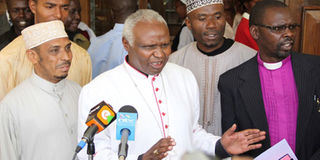Religious leaders are letting Kenyans down

PHOTO | FILE Religious leaders address the press.
What you need to know:
- The country faces many daunting challenges but faiths have contributed little towards resolution or provoking a national debate
- The Christian faith has become a recipe book for miracles and prosperity, an escape route and a substitute for transforming society
A month after the Westgate massacre, the euphoria that marked the patriotic ‘we are one’ campaign has given way to a more realistic examination of how the nation’s institutions responded to the crisis.
The KDF’s preference for Nakumatt paper bags has allowed the foot soldiers to take the blame and distract attention from the commanders who clearly allowed a raid become a massacre by hijacking the rescue operation from the better equipped Recce squad.
It is good to look at the performance of our religious leaders, too, and critically evaluate whether they showed any inspiration or leadership when the nation was in turmoil. Muslim leaders led the rush to condemn the terrorists attack as well as to distance themselves from the attackers who originally were reported as singling out non-Muslims for execution.
Religious leaders are very vocal at condemning violence, and soon press conferences of an inter-religious nature were convened wherever media houses have bureaus. Religious leaders are also pretty good at leading prayers, and so three days later they all assembled in their full regalia at KICC to lead the ecumenical prayers and to share the podium with the political and diplomatic class. And there their contribution ended.
There was no public interrogation by the Islamic community on their failure to prevent the militarisation of many of their youth. Our religious leaders can only contribute with prayers and condemnation but fail to lead national debates on the creation of a new public ethic.
So they mostly make news when they condemn condoms, books and gays, an approach that can hardly appeal to youth looking for guidance. So the major religions appear like hardliner sectarian outfits unable to harness national solidarity around national justice issues because they are just as divided as political parties.
CONTRIBUTED LITTLE
The country faces many daunting challenges but faiths have contributed little towards resolution or provoking a national debate. Take for example the ICC issue. Only Archbishop Okoth supported retaining the country as a member state and favouring the completion of the ongoing cases.
The absence of the other twenty-something Catholic Bishops speaking as a single voice meant that the Kisumu prelate was ignored, and further suggested that the Church is as divided as society on the matter. Various Muslim groups have advised President Kenyatta to boycott his hearing.
The not-so-tiny matter of over Sh300 billion being unaccounted for in government expenditure has gone unaddressed, as has the fact that 65 percent of ‘IDPs’ in Tildet, Trans Nzoia given resettlement grants by DP Ruto two weeks ago turned out to be civil servants.
Every day produces another corruption scandal that affects morale and morals, with the JSC corruption and greed emerging this week. The Christian faith has become a recipe book for miracles and prosperity, an escape route and a substitute for transforming society. The focus is on the next world while this one is ignored.
Whoever disturbs is killed, Archbishop Romero said decades ago; not much chance of that happening these days.





